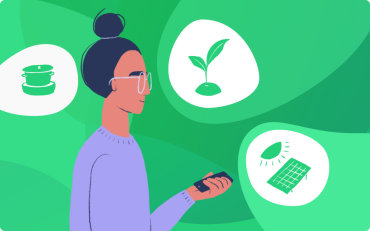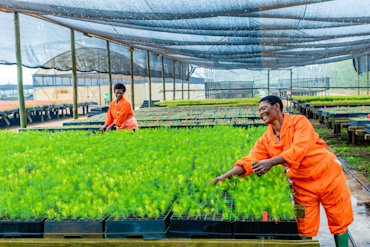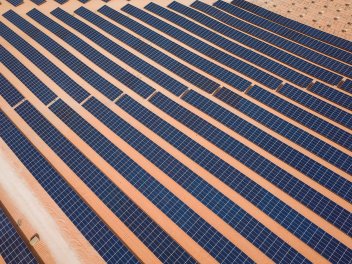Our project in Ghana: How cookstoves can save lives and the climate
Nearly 40% of the world cooks over open fires — emitting CO2e and air pollution into homes and our atmosphere. These clean cookstoves cut carbon and keep trees standing.
Here’s a wild stat: Three billion people depend on chopping down trees to cook their every meal. That’s because 40% of the world cooks over inefficient open flames, producing an estimated 2-5% of annual global CO2e emissions.
What’s more, these stoves are a massive health risk. Toxic fumes and soot escape alongside heat, causing nearly 4 million premature deaths each year — more than traffic accidents and Tuberculosis combined.
In Ghana, the effects of this problem are stark. Over 80% of Ghanaians cook over open fires, breathing toxic fumes every day. And it drives a huge need for firewood: In 2019, Ghana had the fastest rate of rainforest deforestation in the world.
Meet the Ghana Clean Cookstove Project
We’re proud to share our partnership with the Ghana Clean Cookstove Project. Based in towns and cities throughout Ghana, it replaces open fireplaces and dirty stoves with efficient ones that use up to 60% less fuel, protecting local forests and directly benefiting the climate.
The stove they've created is special. Called the Gyapa, it’s made from recycled metal and clay by local manufacturers and ceramicists. It's manufactured to exacting specifications, is twice as efficient as an open-air fire, and burns cleaner, keeping toxins and particulates out of the air.

Shifting how people cook isn’t easy. That’s why the Gyapa was designed with input from Ghanaian cooks to ensure it respects local customs and meets daily needs. The next challenge was raising awareness. The project used creative marketing campaigns to let the community know how efficient and safe these new stoves were, driving demand across the nation.
Cooks and families in Ghana can’t get enough. More than 1.5 million Gyapa Stoves have been sold across Ghana, saving more than 4 million tonnes of CO2e emissions. That’s the equivalent of 860,000 vehicles taken off the road for a year.
For families, there’s a more direct impact. They’ve saved a collective $165 million on fuel costs — money that can help send children to school, buy crucial medicine, and improve homes.
Growing impact in Ghana
What’s next? Thanks to the funds provided through carbon offsets, this project is scaling up in urban centers and looking for new ways to help families cook better, faster, and with less fuel. The project currently works with nearly 800 ceramicists, metalworkers and retailers, bringing in sustainable income and helping families grow healthier and happier.

The project is constantly investing in skills training for workers in its supply chain, and recently completed construction of a high-spec manufacturing facility in Kumasi and a new facility in Accra. As the project grows, more trees will be left standing, families can live healthier, and extra income can be invested in the future.
This combination of social benefit and climate action is what makes the Ghana Cookstove Project so special, and it’s why we’re proud to help it grow.
Can’t wait to support this awesome project and others like it? Simply download Klima from the Apple App Store or Google Play Store and start empowering communities around the world today.



